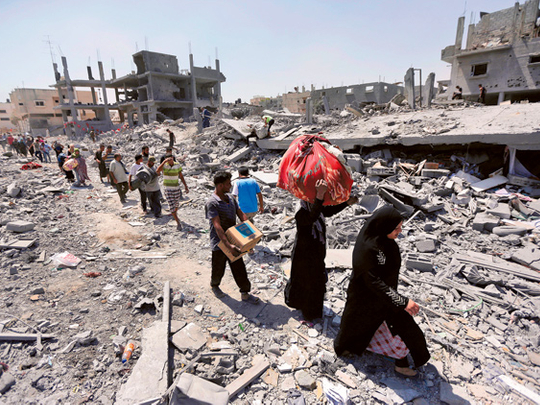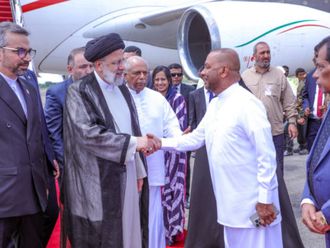
Gaza: Nearly a month into Israel’s fierce assault on Hamas in Gaza, Palestinian President Mahmoud Abbas is facing mounting domestic pressure to seek war crimes charges against Israel at the International Criminal Court.
He has hesitated in the past because such a move would instantly put the Palestinians on a risky collision course with Israel. But with more than 1,400 Palestinians killed in Gaza, according to health officials, Abbas has signalled he might move ahead — cautiously.
Palestinian officials said that Abbas asked all Palestinian political factions, including Hamas and the smaller group Islamic Jihad, to give their written consent to such a move. Different PLO factions signed up in a meeting in the West Bank earlier this week, while Abbas is still waiting for a response from Hamas and Islamic Jihad, they said.
In trying to make a case against Israel, Abbas could also expose Hamas, a bitter rival turned potential political partner, to war crimes prosecution because it has fired thousands of rockets from Gaza at Israeli communities over the years.
“This option is a double-edged sword,” Abbas’ Fatah movement wrote on its official Facebook page on Thursday, saying he would only move ahead once he has the approval of Hamas.
In Geneva, UN High Commissioner for Human Rights Navi Pillay on Thursday accused both Israel and Hamas fighters of violating the rules of war.
At the United Nations, Riyad Mansour, the Palestinian UN ambassador, told reporters, “There is no safe place in the Gaza Strip.”
After the first war in 2009, Abbas — in an apparent effort not to antagonise the US — helped freeze a UN report that called on Israel and Hamas to prosecute any war crimes or face scrutiny by the ICC.
Now, Abbas has more tools at his disposal.
In November 2012, the UN General Assembly recognised Palestine in the West Bank, Gaza and occupied east Jerusalem — lands Israel captured in 1967 — as a non-member observer state.
This state remains largely theoretical since Israel retains control of the West Bank and occupied east Jerusalem and of Gaza’s border points. However, the UN vote improved Palestinian chances to seek admission to the International Criminal Court since the tribunal only has jurisdiction over crimes committed in the territory of a state.
The statehood recognition paved the way for the Palestinians to seek membership in dozens of UN agencies and international conventions.
Abbas signed a first batch after nine months of US-brokered negotiations with Israel ran aground in April, and Palestinian officials said more membership requests would follow, despite opposition by Israel and the US.
Gaining membership to the ICC has been considered the Palestinian “doomsday weapon” because it would likely invite major Israeli retaliation.
But widespread anger in the West Bank over the rising casualties in Gaza has increased pressure on Abbas to act.
“People feel that this tool should be used to stop the Israeli crimes,” said former Palestinian government spokesman Gassan Khatib.
“When people in the West Bank see these scenes that are occurring now in Gaza, they feel that they should support their brothers in Gaza, and the first thing that comes to their mind is the issue of the ICC because they think that it is possible and thus they are pushing more and more for it now,” he said.
Independent legislator Mustafa Barghouti said that leaders of political factions in the West Bank have repeatedly urged Abbas to act.
“We have been pressing him for a long time,” he said.
At a meeting Tuesday with political leaders and faction chiefs, Abbas asked participants to sign a declaration of support for such a move, said Barghouti, adding that everyone signed.
The final decision would still be up to Abbas, according to other participants who spoke on condition of anonymity.
They said Abbas also told them he would not move forward without written consent from Hamas and Islamic Jihad because they could expose themselves to possible war crimes charges.
One of the participants expressed concern that this was a stalling tactic by Abbas, arguing that it was unlikely for Hamas to support such a move.
Hamas officials in Gaza were not available for comment.












